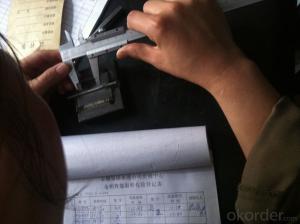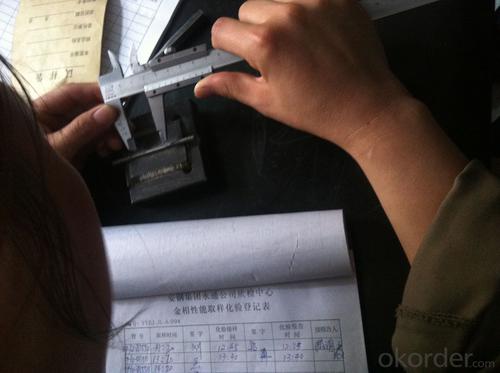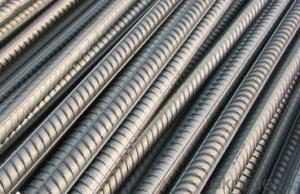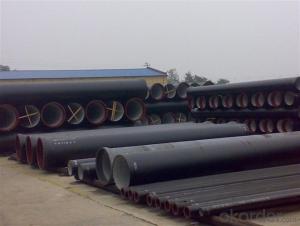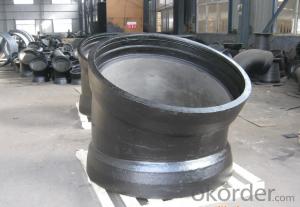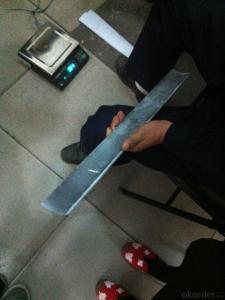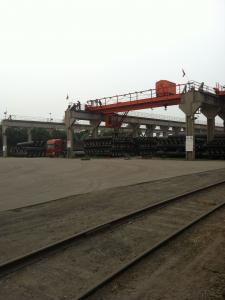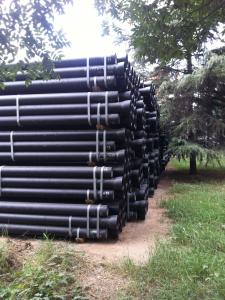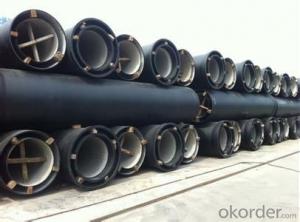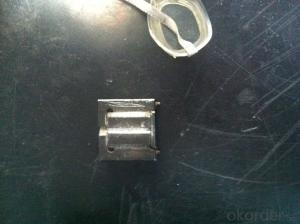DUCTILE IRON PIPEs K9 CLASS DN1200
- Loading Port:
- Tianjin
- Payment Terms:
- TT OR LC
- Min Order Qty:
- 32 pc
- Supply Capability:
- 3000 pc/month
OKorder Service Pledge
OKorder Financial Service
You Might Also Like
· Material : Ductile Cast Iron
· Size Range : DN 80mm to DN 2000mm
· Unit Effective Length : 6m or 5.7m
· Manufacture Standard: ISO 2531:1998/ EN 545:2006/EN 598:2007
· Annual capacity : 200,000 tons
· Coating Exterior: Zinc 130g/m2 according to ISO 8179-1 and bitumen coating 70 microns.
· Cement Interior: Portland Cement/ High Alumina Cement/ Sulphate Resisting Cement Lining according to ISO 4179
· Special requirements on external coating and internal lining can be applied
· We also provide accessories such as SBR/EPDM rubber gaskets, lubricant paste, pipe caps, PE sleeves, etc.
Additional Parts:
Each pipe is strictly inspected according to related standard to ensure permanently high performance.
Easy Installation at site and service free for life
Long Service Lifespan
Quotation will arrive you within 24hours once we get your inquiry.
We guarantee offering you a competitive price.
A copy of original inspection reports of pipes will be offered after shipment.
Photos of loading process will be sent to the customer after shipment effect.
We will follow-up the delivery progress after shipment effect and update to the customer on weekly basis.
- Q: Can ductile iron pipe be used for trenchless installation methods?
- Yes, ductile iron pipe can be used for trenchless installation methods. Trenchless installation methods, such as horizontal directional drilling (HDD) or pipe bursting, are techniques used to install underground utilities with minimal excavation and disruption to the surrounding environment. Ductile iron pipe is well-suited for these methods due to its inherent strength, durability, and flexibility. It can withstand the forces and stress associated with trenchless installation, including the pulling forces during HDD or the bursting forces during pipe bursting. Additionally, ductile iron pipe's corrosion resistance makes it suitable for applications where the pipe is installed underground without the need for protective coatings. Therefore, ductile iron pipe is a reliable choice for trenchless installation methods.
- Q: What are the common methods for cutting ductile iron pipes?
- There are several common methods for cutting ductile iron pipes, depending on the specific requirements and tools available. 1. Hand Saw: A hand saw with a carbide-tipped blade is commonly used for cutting smaller diameter ductile iron pipes. This method requires physical effort and may be time-consuming. 2. Reciprocating Saw: A reciprocating saw with a diamond or carbide abrasive blade is a more efficient option for cutting ductile iron pipes. This power tool allows for faster cutting and requires less physical effort. 3. Cut-Off Saw: A cut-off saw, also known as a chop saw or disc cutter, equipped with a diamond or abrasive blade is a popular method for cutting ductile iron pipes. This power tool provides precise and fast cuts, making it suitable for both small and large diameter pipes. 4. Band Saw: A band saw with a bi-metal or carbide-tipped blade is commonly used for cutting larger diameter ductile iron pipes. This method allows for clean and precise cuts, but it may require specialized equipment and expertise. 5. Grinding Wheel: In some cases, a grinding wheel with a diamond or abrasive disc can be used to cut ductile iron pipes. This method is suitable for smaller diameter pipes or when other cutting tools are not available. It is important to note that regardless of the method used, proper safety precautions should always be followed, including wearing appropriate protective gear and using clamps or vices to secure the pipe during cutting. Additionally, it is recommended to consult with professionals or manufacturers' guidelines for specific recommendations on cutting ductile iron pipes.
- Q: How do ductile iron pipes handle soil movement?
- Ductile iron pipes are known for their excellent strength and durability, making them highly capable of handling soil movement. These pipes are designed to resist external loads and pressures caused by soil settlement, ground shifting, or other environmental factors. One of the key features of ductile iron pipes is their flexibility. Unlike rigid materials such as cast iron or concrete pipes, ductile iron pipes have a certain level of elasticity that allows them to withstand soil movement without cracking or breaking. This flexibility enables the pipes to absorb the stresses induced by the soil, preventing any significant damage to the pipeline system. Furthermore, ductile iron pipes possess high tensile strength, which means they can resist pulling forces resulting from soil movement. The pipes can withstand the expansion and contraction of the surrounding soil, reducing the risk of pipe deformation or failure. Moreover, ductile iron pipes are often installed with proper bedding and backfilling techniques to further enhance their ability to handle soil movement. Adequate bedding materials, such as crushed stone or sand, are used to provide stable support to the pipes and distribute the external loads evenly. This helps to minimize the impact of soil movement on the pipes and maintain their structural integrity. In summary, ductile iron pipes are designed to effectively handle soil movement due to their flexibility, high tensile strength, and proper installation methods. These pipes can withstand the stresses induced by soil settlement, ground shifting, or other soil-related factors, ensuring reliable and long-lasting performance in various environmental conditions.
- Q: Are ductile iron pipes resistant to chemical attacks?
- Yes, ductile iron pipes are generally resistant to chemical attacks. Ductile iron is known for its high corrosion resistance, making it suitable for a wide range of applications including water and wastewater systems. Ductile iron pipes are typically lined with a protective coating such as cement mortar or epoxy to further enhance their resistance to chemical attacks. This lining acts as a barrier between the pipe material and the corrosive substances, preventing any degradation of the iron. However, it is important to note that the level of resistance can vary depending on the specific chemical being transported and the concentration and temperature of the solution. Therefore, it is always advisable to consult with experts or engineers to ensure the suitability of ductile iron pipes for specific chemical environments.
- Q: Can ductile iron pipe be used for fire protection systems?
- Yes, ductile iron pipe can be used for fire protection systems. Ductile iron pipe has excellent resistance to fire, making it a suitable choice for fire protection applications. It is known for its strength, durability, and ability to withstand high temperatures, making it reliable for transporting water or other fire suppression agents.
- Q: How are ductile iron pipes protected against internal corrosion caused by chemicals?
- Ductile iron pipes are protected against internal corrosion caused by chemicals through the application of protective linings or coatings. These linings, such as cement mortar, polyethylene, or epoxy, create a barrier between the pipe and the corrosive chemicals, preventing direct contact and corrosion. Additionally, corrosion inhibitors can be added to the water or fluid being transported to further minimize the risk of internal corrosion. Regular inspection and maintenance also play a crucial role in identifying potential corrosion issues and taking appropriate preventive measures.
- Q: Can ductile iron pipes be recycled?
- Yes, ductile iron pipes can be recycled. Ductile iron is a type of cast iron that has superior strength and durability, making it a popular choice for various applications, including water and sewage pipelines. When these pipes reach the end of their useful life, they can be recycled and used to manufacture new products. The recycling process involves melting down the ductile iron pipes to extract the iron, which can then be used as a raw material for producing new ductile iron products. Recycling ductile iron pipes not only helps conserve natural resources but also reduces the environmental impact associated with mining and manufacturing new materials.
- Q: What is ductile iron?
- Ductile iron is a type of cast iron that has improved strength and ductility due to its unique microstructure. It is created by adding small amounts of magnesium to molten iron, which causes the graphite in the iron to form in a nodular shape rather than in flakes. This nodular graphite structure gives ductile iron its characteristic properties, making it more resistant to cracking and allowing it to be easily machined and welded. Ductile iron is widely used in various industries for its excellent strength, impact resistance, and durability.
- Q: How are ductile iron pipes protected against stray electrical currents?
- Ductile iron pipes, which are commonly used for water and sewer systems, are protected against stray electrical currents through a process known as cathodic protection. This method involves applying a low-voltage direct current (DC) to the pipes, which creates a protective electrical field around them. Cathodic protection is achieved by installing sacrificial anodes or impressed current systems near the ductile iron pipes. Sacrificial anodes, typically made of a more electrically active metal such as zinc or magnesium, are connected to the pipes and serve as the source of electrical current. These anodes corrode over time, sacrificing themselves to protect the pipes from corrosion due to stray electrical currents. Impressed current systems, on the other hand, utilize an external power source to supply the protective electrical current. Rectifiers are used to convert alternating current (AC) to direct current (DC) and the DC is then applied to the pipes through anodes. This method allows for more control over the amount of current being applied, ensuring optimal protection. In both cases, the electrical current flowing through the sacrificial anodes or impressed current systems creates a protective barrier around the ductile iron pipes. This barrier prevents the stray electrical currents from flowing through the pipes, reducing the risk of corrosion and extending the lifespan of the infrastructure. Regular monitoring and maintenance of the cathodic protection system are essential to ensure its effectiveness. This involves inspecting the anodes, checking the electrical current levels, and making any necessary adjustments or replacements to maintain the desired level of protection. Overall, cathodic protection is a reliable and widely used method to protect ductile iron pipes against stray electrical currents, safeguarding the integrity and longevity of water and sewer systems.
- Q: Do ductile iron pipes require special maintenance?
- Indeed, special maintenance is necessary for ductile iron pipes. Despite their reputation for being strong and durable, ductile iron pipes are still vulnerable to specific types of corrosion. To prevent corrosion and extend the pipes' lifespan, regular maintenance is crucial. This maintenance typically involves conducting periodic inspections to identify any signs of corrosion or damage, as well as implementing cleaning and protective coating procedures. Furthermore, it is important to handle and install the pipes correctly to maintain their integrity. By regularly maintaining the pipes and adhering to industry best practices, one can prevent leaks, breaks, and other issues, ultimately saving valuable time and money in the long term.
Send your message to us
DUCTILE IRON PIPEs K9 CLASS DN1200
- Loading Port:
- Tianjin
- Payment Terms:
- TT OR LC
- Min Order Qty:
- 32 pc
- Supply Capability:
- 3000 pc/month
OKorder Service Pledge
OKorder Financial Service
Similar products
Hot products
Hot Searches
Related keywords
